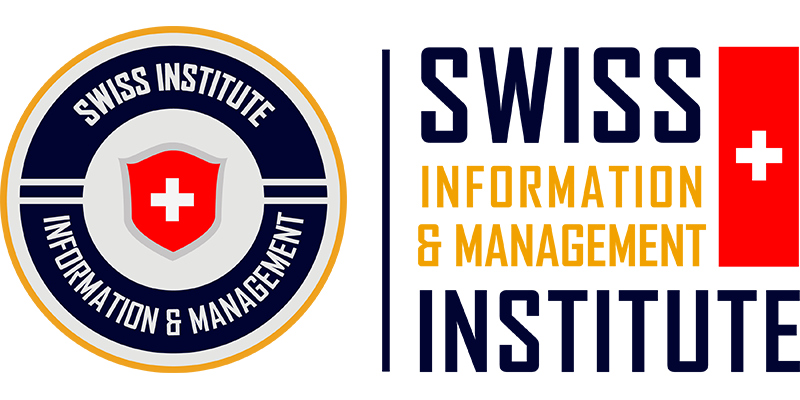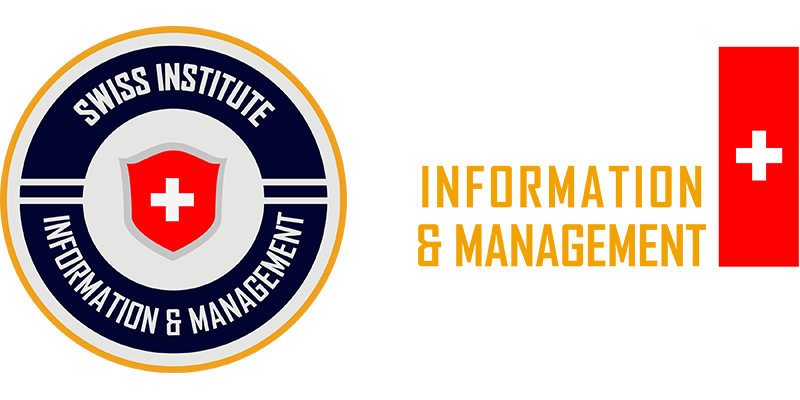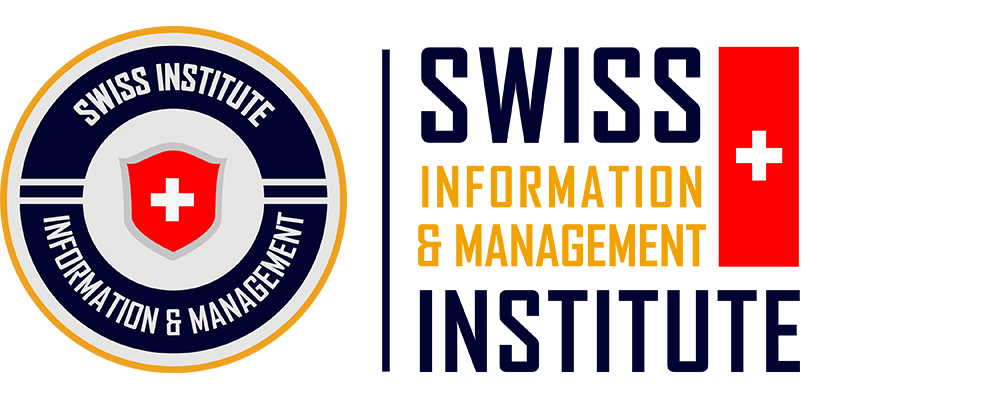Doctor of Business Administration (By Coursework)
The only DBA program in Switzerland aligned with the National Occupational Standard
The Doctor of Business Administration (By Coursework) is rapidly becoming the preferred choice for senior professionals seeking to advance their careers through high-level academic and practical business expertise. Unlike traditional academic programs, the DBA focuses on applying research to real-world business challenges, developing leadership skills to thrive in today’s unpredictable global economy.
This program, developed by DBA Swiss (a member of SIMI Swiss), offers the first DBA aligned with the European National Occupational Standard, providing graduates with a distinguished degree and 30 professional certifications (Pro Recognize).
Designed for working professionals, SIMI and its local academic partners offer academic and English language support, ensuring students are well-prepared for success. Students also benefit from the Swiss Colloquium and various networking opportunities to expand their professional and social connections.
Along with globally recognized qualification, the SIMI Swiss Doctorate program understands what students need:
- Fully Accredited & Recognized
- The Swiss Student Card confirms official Swiss student status and eligibility with SIMI Swiss.
- Certified & Micro-Credentials Included
- Multiple Degrees from SIMI & Prestigious Universities
- Stay updated with the latest trends
- Learn in a flexible way
- Expand your business network
- Academic Support during Study
Dual Qualifications within a Doctorate Program:
- Doctor of Business Administration in Majors from Swiss Information and Management Institute
- Level 8 Diploma in Strategic Management and Leadership Practice from OTHM, the Ofqual UK.Gov Awarding Body (603/6996/6)
International Accreditation
SIMI is accredited at both the institutional and programmatic levels by ASIC, HEAD, ISO 21001:2018, OTHM, and Qualifi, which is recognized by Ofqual.
Dual Qualification with OTHM
The program is widely recognized by the business community and partners, helping to optimize the use of the diploma after graduation.
30 Pro Recognize credentials
Learners earn 30 professional recognized certifications aligned with the European occupational framework, optimizing their skills upon graduation.
Academic & Research Support
The academic, research and language support system helps students overcome challenges so they can focus solely on excelling in their studies.
Courses & Learning Outcomes
1. Developing Strategic Management and Leadership Potential (L/618/5988)
Overview
This module develops learners' understanding of strategic management in a globalized world and explores how leadership influences and informs strategic change. It covers key concepts such as evaluating strategic positions, making strategic choices, and taking strategic actions.
Unit Aims
- Analyze external influences on an organization’s strategy.
- Evaluate the dynamic capabilities and core competences of an organization.
- Appraise strategic options and evaluate approaches to strategy implementation.
- Understand how leadership impacts strategic decision-making.
Course Details
This course is accredited and mapped to National Occupational Standards. It can also be accumulated towards earning a Doctoral Award from SIMI Swiss if taken independently.
- View details on Learning Outcomes, Topics, and Suggested Readings HERE.
2. Managing Strategic Change (R/618/5989)
Overview
This unit explores theories and models of change management, focusing on their application to contemporary organizations. It emphasizes understanding the role of leadership and change agents in facilitating successful organizational change.
Unit Aims
- Evaluate theories and approaches to managing strategic change.
- Develop strategies for implementing organizational change.
- Analyze stakeholder responses to change and manage resistance.
- Assess the role of organizational culture in change management.
Course Details
This course is accredited and mapped to National Occupational Standards. It can also be accumulated towards earning a Doctoral Award from SIMI Swiss if taken independently.
- View details on Learning Outcomes, Topics, and Suggested Readings HERE.
3. Project Development, Planning and Management (J/618/5990)
Overview
This unit introduces key concepts in project management, with a focus on managing research projects from a DBA perspective. It highlights the challenges and best practices in managing DBA research and provides practical tools for project planning.
Unit Aims
- Understand the fundamentals of project management methodologies and processes.
- Develop the ability to manage risks in research projects.
- Learn to divide a research project into work packages and milestones.
- Address challenges related to managing DBA research projects.
Course Details
This course is accredited and mapped to National Occupational Standards. It can also be accumulated towards earning a Doctoral Award from SIMI Swiss if taken independently.
- View details on Learning Outcomes, Topics, and Suggested Readings HERE.
4. Advanced Research Design and Methodologies (L/618/5991)
Overview
This module builds on existing knowledge of research methods, focusing on advanced research designs and methodologies. It emphasizes the application of both qualitative and quantitative data analysis techniques for business research.
Unit Aims
- Analyze various research approaches and propose appropriate methodologies.
- Evaluate and apply advanced data collection techniques.
- Conduct comprehensive data analysis using advanced statistical tools and qualitative techniques.
- Understand the ethical considerations in research.
Course Details
This course is accredited and mapped to National Occupational Standards. It can also be accumulated towards earning a Doctoral Award from SIMI Swiss if taken independently.
- View details on Learning Outcomes, Topics, and Suggested Readings HERE.
5. Developing Research Capability (R/618/5992)
Overview
This unit focuses on the role of research in solving business problems. It emphasizes critically evaluating existing literature and establishing the need for further research in business contexts.
Unit Aims
- Understand the importance of business research in addressing organizational challenges.
- Evaluate existing literature and identify gaps for further investigation.
- Develop theoretical solutions to business problems and justify the need for research.
- Examine the philosophical, ontological, and epistemological perspectives of research.
Course Details
This course is accredited and mapped to National Occupational Standards. It can also be accumulated towards earning a Doctoral Award from SIMI Swiss if taken independently.
- View details on Learning Outcomes, Topics, and Suggested Readings HERE.
6. Strategic Financial Management (L/616/2727)
Overview
This module focuses on the integration of financial management within strategic decision-making. It explores how financial tools and techniques can be applied to assess an organization’s financial health and support the development of long-term business strategies.
Unit Aims
- Analyze financial data to assess an organization's strategic position.
- Apply financial models and tools to develop and evaluate business strategies.
- Understand the relationship between financial management and business sustainability.
- Critically evaluate how financial management supports decision-making in a globalized environment.
Course Details
This course is accredited and mapped to National Occupational Standards. It can also be accumulated towards earning a Doctoral Award from SIMI Swiss if taken independently.
- View details on Learning Outcomes, Topics, and Suggested Readings HERE.
7. Entrepreneurship and Innovation (Y/616/2729)
Overview
This unit introduces learners to the fundamentals of entrepreneurship and innovation. It covers the process of establishing enterprises, fostering creativity, and leading change in a competitive global environment.
Unit Aims
- Critically analyze the concepts of entrepreneurship and innovation.
- Evaluate how to lead others to embrace innovation and change.
- Develop business ideas and evaluate their feasibility.
- Formulate a business plan and develop strategies for successful business execution.
Course Details
This course is accredited and mapped to National Occupational Standards. It can also be accumulated towards earning a Doctoral Award from SIMI Swiss if taken independently.
- View details on Learning Outcomes, Topics, and Suggested Readings HERE.
8. Strategic Human Resource Management (F/616/2725)
Overview
This unit develops learners’ understanding of the strategic management of human resources and its impact on organizational success. It explores key HRM functions and their alignment with organizational goals in various contexts.
Unit Aims
- Understand the strategic role of human resource management in organizations.
- Analyze the business factors influencing human resource planning and development.
- Develop HR strategies that align with organizational mission, vision, and objectives.
- Evaluate legal, ethical, and CSR issues in human resource management.
Course Details
This course is accredited and mapped to National Occupational Standards. It can also be accumulated towards earning a Doctoral Award from SIMI Swiss if taken independently.
- View details on Learning Outcomes, Topics, and Suggested Readings HERE.
Doctorate Thesis Stage
Doctoral Thesis
A Doctoral Thesis is a comprehensive, final assignment that Doctorate students complete at the end of their program. It is designed to encapsulate the knowledge and skills they have acquired throughout their studies. Unlike traditional exams, a Doctoral Thesis requires students to apply what they've learned to a real-world problem or challenge in their field.
Lists of majors:
- DBA in International Business
- DBA in Hospitality Management
- DBA in Public Administration
- DBA in Hospital Management
- DBA in Pharmaceutical Management
- DBA in Healthcare Management
- DBA in Human Resources Management
- DBA in Finance & Banking
- DBA in Logistics and Supply Chain Management
- DBA in Tourism Management
- DBA in Luxury Management
- DBA in Engineer Management
- DBA in Technical Management
- DBA in Construction Management
- DBA in Design Management
- DBA in Information Technology Management
And other majors based on the Doctoral Thesis.
Key Features of a Doctoral Thesis:
- Practical Application: The project typically involves solving a real-world business problem, conducting research, or developing strategies for organizational improvement, innovation, or leadership.
- Integration of Knowledge: Students must integrate and apply concepts from multiple courses, showcasing their ability to synthesize information and use it effectively in a business context.
- Research Component: A significant research element is required, where students gather, analyze, and interpret data to support their conclusions and business recommendations.
- Presentation and Defense: Upon completion, students present their project to a panel of faculty members or industry professionals and defend their methodology, findings, and strategic recommendations.
Benefits of a Doctoral Thesis:
- Real-World Experience: Students gain hands-on experience by addressing and solving real-world business challenges, from operational improvements to strategic development.
- Skill Development: The project strengthens critical thinking, problem-solving, research, and communication skills, essential for leadership roles.
- Portfolio Piece: The completed thesis serves as a showcase of the student’s capabilities, beneficial for career advancement or entrepreneurial ventures.
- Networking: Projects often involve collaboration with industry professionals, offering valuable networking opportunities for future career growth.
In essence, a Doctoral Thesis is the culmination of a DBA program, allowing students to demonstrate their expertise and readiness for professional challenges.
Entry requirements & Learning methods
1. Entry Requirements
In addition to the entry requirements, candidates applying to the program are also assessed for their suitability by the admissions committee before joining the program to ensure that they can acquire and benefit from the program.
Entry requirements:
To enroll in this program, learners must be over 24 years old and meet at least one of the following criteria:
- A Master’s qualification in Majors from accredited universities; or
- A Level 7 EQF diploma or equivalent. Level 7 Diploma must be from organizations that are authorized to issue qualifications and have been accredited
English requirements:
If a learner is not from a predominantly English-speaking country, proof of English language proficiency must be provided.
- Common European Framework of Reference (CEFR) level B2 or equivalent;
- Or A minimum TOEFL score of 101 or IELTS 5.5; Reading and Writing must be at 5.5 or equivalent.
Please note:
- SIMI Swiss does not accept entry qualifications from counterfeit universities, Diploma Mills, or universities accredited by unreliable accreditation agencies.
- SIMI reserves the right to make admissions decisions based on the requirements of recognized agencies and the global quotas of the program.
2. Learning methods
1. Off-Campus Mode
The program is a combination between Live Classes with local tutors (where applicable) for a hybrid learning experience.
- Offering interactive, real-time engagement with instructors.
- Local tutors provide additional guidance to help learners apply theoretical concepts to practical scenarios.
- Ideal for busy professionals seeking flexibility with personalized support.
Learn more about overview of enrolling in online classes at SIMI Swiss [Video HERE]
Learn more about the Effective of SIMI Pedagogy [Video HERE]
2. Fully Online Model
The program is implemented using a combined automated training model that includes:
- Optimized Online Learning System: Designed to enhance the self-study process.
- Bite-Sized Lectures: Lessons are structured in short, manageable modules, enabling students to grasp the content immediately after completing each module.
- Comprehensive Support System: Provides students with the necessary tools and support to efficiently fulfill course requirements.
Learn more about how to use the automated training model at SIMI Swiss [Video HERE]
3. Academic Support
We understand that pursuing an accredited postgraduate program can be both exciting and challenging, especially for busy adult learners. To help you overcome these challenges, we’ve created the SIMI Swiss Supporting Systems, designed to guide you through any difficulties during your studies.
For a full overview of the support available, be sure to watch our informative videos, offering help at every stage of your academic journey.
Supplemental resources and Pro Certified
1. Supply 30 courses mapped to National Occupational Standards
The National Occupational Standard is a crucial benchmark that ensures educational programs meet workplace demands. The DBA program is fully aligned with the Operational Research Specialist position according to the national competency framework.
Beyond the comprehensive DBA curriculum, students gain access to an additional 30 professional modules covering a wide range of specializations. This expanded knowledge base enables students to build on their classroom learning and directly apply it to their specific job roles and needs, offering valuable tools for professional growth.
Unlike other study materials, this interactive and exclusive set of resources, developed by SIMI Swiss, is specifically designed for self-study. The knowledge system, aligned with the National Occupational Standard, is divided into 30 knowledge groups, each further broken down into bite-sized lessons. This approach allows students to absorb content quickly and effectively, even when away from their computer or phone.
- Learn more about the National Occupational Standard system [HERE].
- Learn more about the exclusive pedagogy for the supplemental interactive study materials [HERE].
- Learn more about the Professional Certified Level 7 EQF [HERE]
The 30 interactive courses that enhance knowledge and automatically accumulate 30 separate Pro Certifications Level 7 EQF include:
- Qualities of effective leadership: Learners will explore the making and developing of powerful leaders.
- Developing interpersonal skills: Connecting and bonding with people within the commercial sectors is extremely important for good business. This module trains learners in skills to improve and enhance communication techniques to create strong bonds.
- Motivating and influencing people: Inspiring people to create a unity of direction within business.
- Making decisions: Doing the right things in the right way at the right time. Learners will look at the process of making a good decision.
- Creativity and problem-solving: Do problems pose a threat or are they an opportunity to improve? Here, learners will figure out how to turn a problem into an advantage.
- Studying and using management theories: There are many theories concerned with management and the various models developed from these theories. This module looks over these theories with real-life examples.
- The external operating environment of business: Planning for influences on the business outside your control.
- Culture and ethics: The culture and ethics involved in the business world today.
- Governance and directorships: Structuring and controlling a business in a professional way.
- Analysing the competition: What are my competitors doing, how are they doing it, and why are they doing it? Reviewing and analysing competitors’ actions to enhance managerial roles.
- Marketing strategy: Creating an effective and successful market presence. Looking at the development of marketing strategies to create successful marketing campaigns.
- High performance sales: Learners will grasp the key elements of successful selling.
- E-Marketing communication: Understanding and using effective electronic messages to market.
- Customers and their needs: Ensuring that your customers are recognised and valued.
- Strategic human resource management: Human Resource Management must play a central role in the strategy of any organization. It is concerned with people as an asset of the business.
- Recruiting and CPD: Getting the best people. Developing the best people. Keeping the best people.
- Measuring and rewarding performance: Knowing and measuring how your people are performing.
- Interpreting business accounts: Using and understanding the litmus tests of business health.
- Tools of financial analysis: Resources, tools, and techniques to keep a finger on the pulse of the business.
- Managing cash and working capital: Cash, cash flow, and working capital. The lifeblood of business.
- Exercises in quantitative techniques: How to use and understand key figures.
- Impact of technology on business: Analyse and exploit the role of e-business within a business sector.
- Innovation and R&D: Creating commercial advantage from innovation and research.
- Implementing and managing quality systems: Right first time, right every time. The place of quality in business strategy.
- Strategic planning tools: Resources, tools, and ideas to help create an effective business strategy.
- Strategic and systems management: Options for strategic direction. Making the right choices for your business.
- The business plan: Creating a plan that targets the stated aims and objectives of a business.
- Developing high-performance teams: Cohesion and teamwork that enhances business performance.
- Managing projects: Getting things done. Using the right tools to run projects.
- Strategies for growth: This module explores the different ideas of growth and the various tools, measures, and controls at a manager’s disposal in planning for growth.
2. Supply 30 webinars mapped to National Occupational Standards
In addition to comprehensive lessons with built-in interactive activities and an exclusive self-study pedagogy, each knowledge module aligned with the National Occupational Standard includes instructional videos (webinars). Doctorate students are provided with 30 video webinars corresponding to the 30 interactive modules, ensuring a well-rounded and complete learning experience.
The 30 video webinars include:
- Webinar - Qualities of effective leadership: Learners will explore the making and developing of powerful leaders.
- Webinar - Developing interpersonal skills: Connecting and bonding with people within the commercial sectors is extremely important for good business. This module trains learners in skills to improve and enhance communication techniques to create strong bonds.
- Webinar - Motivating and influencing people: Inspiring people to create a unity of direction within business.
- Webinar - Making decisions: Doing the right things in the right way at the right time. Learners will look at the process of making a good decision.
- Webinar - Creativity and problem-solving: Do problems pose a threat or are they an opportunity to improve? Here, learners will figure out how to turn a problem into an advantage.
- Webinar - Studying and using management theories: There are many theories concerned with management and the various models developed from these theories. This module looks over these theories with real-life examples.
- Webinar - The external operating environment of business: Planning for influences on the business outside your control.
- Webinar - Culture and ethics: The culture and ethics involved in the business world today.
- Webinar - Governance and directorships: Structuring and controlling a business in a professional way.
- Webinar - Analysing the competition: What are my competitors doing, how are they doing it, and why are they doing it? Reviewing and analysing competitors’ actions to enhance managerial roles.
- Webinar - Marketing strategy: Creating an effective and successful market presence. Looking at the development of marketing strategies to create successful marketing campaigns.
- Webinar - High performance sales: Learners will grasp the key elements of successful selling.
- Webinar - E-Marketing communication: Understanding and using effective electronic messages to market.
- Webinar - Customers and their needs: Ensuring that your customers are recognised and valued.
- Webinar - Strategic human resource management: Human Resource Management must play a central role in the strategy of any organization. It is concerned with people as an asset of the business.
- Webinar - Recruiting and CPD: Getting the best people. Developing the best people. Keeping the best people.
- Webinar - Measuring and rewarding performance: Knowing and measuring how your people are performing.
- Webinar - Interpreting business accounts: Using and understanding the litmus tests of business health.
- Webinar - Tools of financial analysis: Resources, tools, and techniques to keep a finger on the pulse of the business.
- Webinar - Managing cash and working capital: Cash, cash flow, and working capital. The lifeblood of business.
- Webinar - Exercises in quantitative techniques: How to use and understand key figures.
- Webinar - Impact of technology on business: Analyse and exploit the role of e-business within a business sector.
- Webinar - Innovation and R&D: Creating commercial advantage from innovation and research.
- Webinar - Implementing and managing quality systems: Right first time, right every time. The place of quality in business strategy.
- Webinar - Strategic planning tools: Resources, tools, and ideas to help create an effective business strategy.
- Webinar - Strategic and systems management: Options for strategic direction. Making the right choices for your business.
- Webinar - The business plan: Creating a plan that targets the stated aims and objectives of a business.
- Webinar - Developing high-performance teams: Cohesion and teamwork that enhances business performance.
- Webinar - Managing projects: Getting things done. Using the right tools to run projects.
- Webinar - Strategies for growth: This module explores the different ideas of growth and the various tools, measures, and controls at a manager’s disposal in planning for growth.
3. Earn 30 Level 7 EQF Pro Certifications via automated testing
While an DBA degree certifies academic achievement at the Level 7 EQF , in the workplace, Level 7 EQF Pro Certifications help professionals demonstrate their knowledge, skills, and ability to take responsibility in their specific fields.
As a program mapped to National Occupational Standards, along with the supplemental knowledge system, students can engage in self-study through interactive lessons, attend webinars, and take online tests to earn 30 Level 7 EQF Pro Certifications. Each ProCert reflects Level 7 EQF, outlines the Learning Outcomes, and provides certification upon completion.
If students wish to convert their e-Pro Certifications at Level 7 EQF to hard copies, they can use an optional service for a minimal fee.
The 30 Level 7 EQF ProCerts that learners can obtain during the DBA program (note: this is optional):
- Level 7 Certified for Qualities of effective leadership
- Level 7 Certified for Developing interpersonal skills
- Level 7 Certified for Motivating and influencing people
- Level 7 Certified for Making decisions
- Level 7 Certified for Creativity and problem-solving
- Level 7 Certified for Studying and using management theories
- Level 7 Certified for The external operating environment of business
- Level 7 Certified for Culture and ethics
- Level 7 Certified for Governance and directorships
- Level 7 Certified for Analysing the competition
- Level 7 Certified for Marketing strategy
- Level 7 Certified for High performance sales
- Level 7 Certified for E-Marketing communication
- Level 7 Certified for Customers and their needs
- Level 7 Certified for Strategic human resource management
- Level 7 Certified for Recruiting and CPD
- Level 7 Certified for Measuring and rewarding performance
- Level 7 Certified for Interpreting business accounts
- Level 7 Certified for Tools of financial analysis
- Level 7 Certified for Managing cash and working capital
- Level 7 Certified for Exercises in quantitative techniques
- Level 7 Certified for Impact of technology on business
- Level 7 Certified for Innovation and R&D
- Level 7 Certified for Implementing and managing quality systems
- Level 7 Certified for Strategic planning tools
- Level 7 Certified for Strategic and systems management
- Level 7 Certified for The business plan
- Level 7 Certified for Developing high-performance teams
- Level 7 Certified for Managing projects
- Level 7 Certified for Strategies for growth
Check out the way you could get 30 electric Level 7 EQF Professional Certified [Video HERE]
Program accreditations
1. Accreditation review guidelines by SIMI Swiss
SIMI is the first higher education institute in Zug, Switzerland, to achieve comprehensive international accreditations at both the organizational and program levels. The video below guides you through the step-by-step process of verifying and checking SIMI Swiss's accreditations and recognitions.
- Watch this video to learn how to verify SIMI Swiss's accreditations and recognitions HERE.
- View the complete accreditation system of SIMI Swiss HERE.
Sample Certificate of Doctor of Business Administration in [Specialization]:
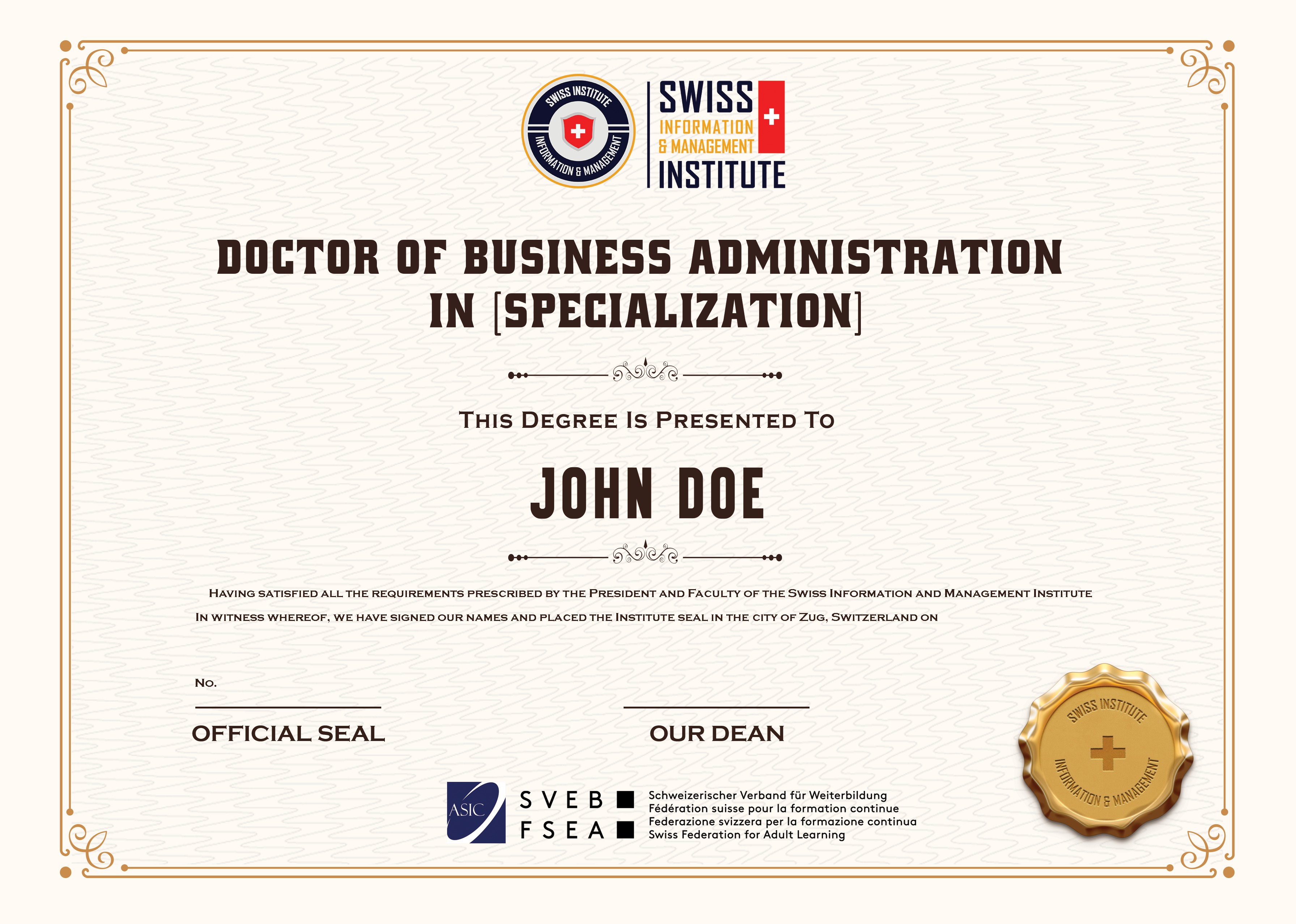
2. Refer to SIMI Swiss Program information in SVEB Switzerland
SVEB Switzerland (Schweizerischer Verband für Weiterbildung) is the Swiss Federation for Adult Learning and serves as the national umbrella organization for adult education in Switzerland. SVEB is recognized as the leading authority in Switzerland for promoting and supporting lifelong learning and professional development through a wide range of educational programs and certifications.
Benefits of the SIMI Swiss Programs Published in SVEB:
- Officially on the Swiss federal portal: Being published in SVEB gives the SIMI Swiss program official publication in Switzerland, validating its quality and adherence to Swiss educational standards.
- Increased Credibility: Membership and listing with SVEB enhance the credibility of the SIMI program, making it more attractive to prospective students and employers who value SVEB-approved programs.
- Professional Advancement: Programs listed with SVEB are often aligned with the needs of the Swiss job market, increasing graduates' employability and supporting their career progression within Switzerland.
- Access to a Wider Network: Association with SVEB connects the SIMI Swiss program to a broader network of educational institutions, professionals, and employers across Switzerland, offering opportunities for collaboration, networking, and knowledge exchange.
- Compliance with Swiss Standards: SVEB ensures that SIMI Swiss programs meet high educational standards, including up-to-date content, qualified instructors, and effective teaching methods, enhancing the overall learning experience for students.
- Support for Lifelong Learning: SVEB’s focus on adult education means the SIMI Swiss program aligns with lifelong learning principles, supporting students in their ongoing professional development.
Check the SIMI programs on SVEB HERE.
3. Accreditation of Level 8 Diploma in Strategic Management and Leadership Practice of OTHM
The DBA program at SIMI Swiss offers a dual degree in partnership with OTHM, the Ofqual UK.Gov awarding body:
- Recognized as an organization by the educational authority of the United Kingdom, Ofqual (UK.Gov). Recognition Number: RN5284. Refer to the recognition information CLICK HERE
- OTHM Level 8 Diploma in Strategic Management and Leadership Practice is accredited with the Ofqual UK.Gov code 603/6996/6. Refer to the accreditation information CLICK HERE
Reference:
- Guidelines of how to check the recognition of OTHM: CLICK HERE
- Why Level UK offers optimal educational effectiveness for learners?: CLICK HERE
- The meaning of Level System in the labor market in the context of global labor mobility: CLICK HERE
- The meaning of Level System in global diploma recognition: CLICK HERE
Sample Certificate of Level 8 Diploma in Strategic Management and Leadership Practice:
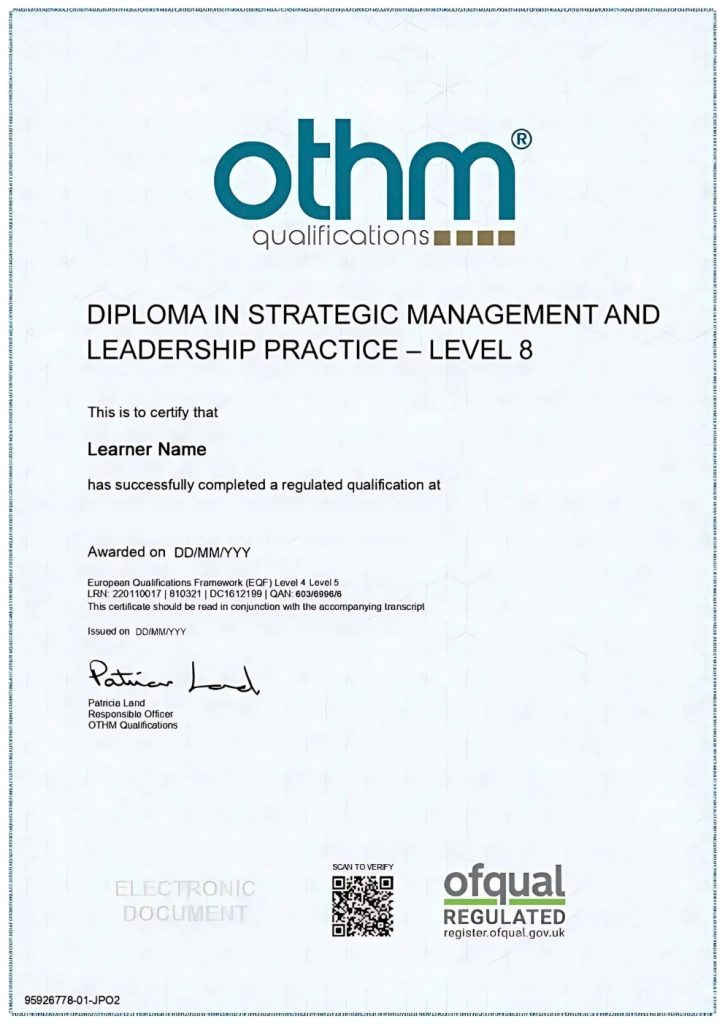
Sample Transcript of Level 8 in Strategic Management and Leadership Practice::
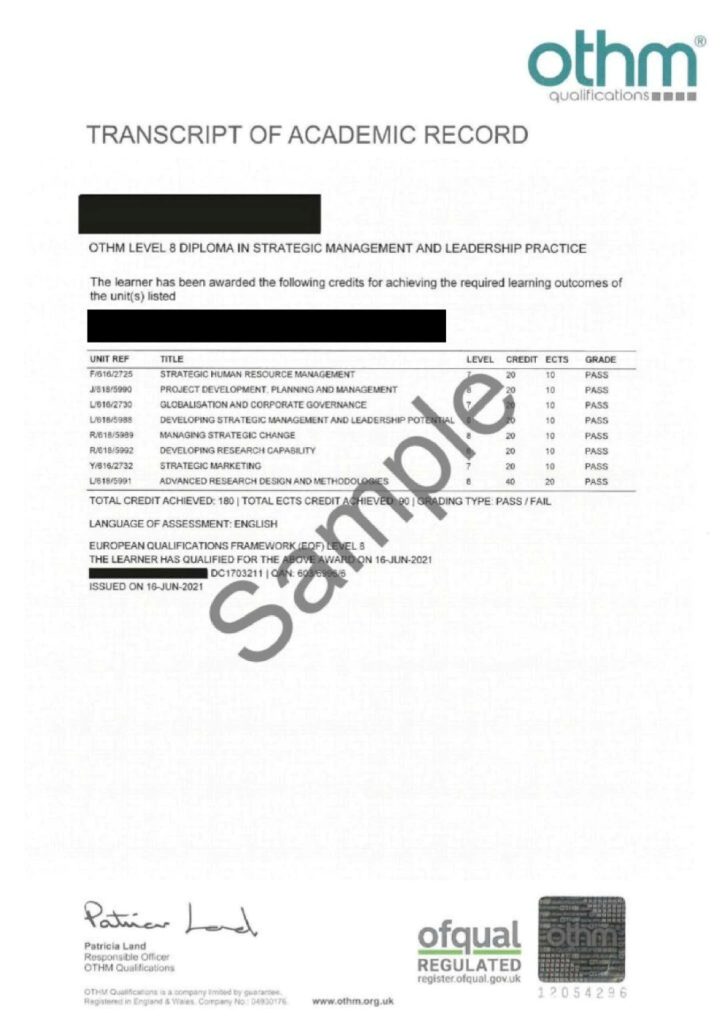
You will get
Dual Doctorate
30 Pro Recognized
Swiss Student Card
Academic Support
Update Trend
All Doctorate Programs
Fully Accredited
Multi Recognition
Doctor of Business Administration (By Coursework)
Powered by BizSchool of Zug
Doctor of Business Administration (By Research)
Powered by BizSchool of Zug
Doctor of Education (By Coursework)
Powered by Swiss EduSchool
Doctor of Education (By Research)
Powered by Swiss EduSchool
Doctor of Business Administration (By Publication)
Powered by Swiss Doctorate
Doctor of Education Management & Innovation Pedagogy (By Publication)
Powered by Swiss Doctorate
Doctor of Logistics & Supply Chain Management (By Publication)
Powered by Swiss Doctorate
Doctor of Information Technology (By Publication)
Powered by Swiss Doctorate
Doctor of Hospitality Management (By Publication)
Powered by Swiss Doctorate
Doctor of Healthcare Management (By Publication)
Powered by Swiss Doctorate
Post Doctoral (Postdoc)
Powered by Swiss Doctorate
